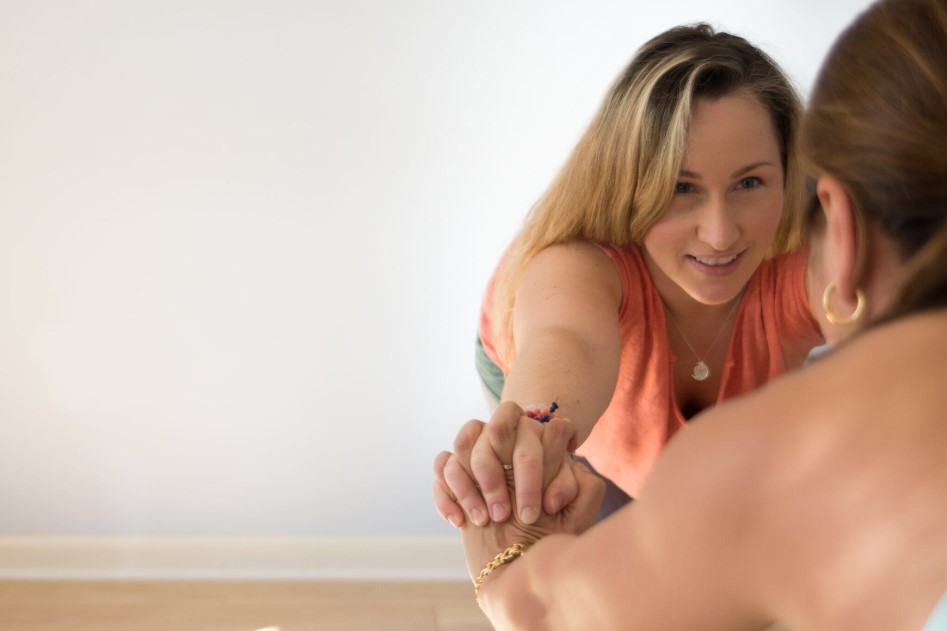
Nicole Teufel, pictured, will teach yoga to Syrian refugees 18 and older. Photo courtesy of Blue Moon Wild Yoga Studio.
Researchers with the Wayne State University School of Medicine Department of Psychiatry and Behavioral Neurosciences have teamed with the Detroit refugee resettlement nonprofit Samaritas to pilot three creativity-based behavioral interventions for Syrian refugees living in metropolitan Detroit.
The project, which will incorporate art, movement and mindful yoga for refugee mothers and their children, is supported by Samaritas' School Impact program and Trauma Support team. Samaritas is the largest refugee resettlement organization in the state and the fourth-largest in the country.
The 10-week program, based at WSU's Tolan Park Medical Office Building, will help newly-arrived mothers and children become grounded and work out their emotions regarding their journey and any traumas that accompanied it through weekly, 90-minute classes. The classes launch June 30 and include a dance class for children ages 7-12, art therapy for adolescents ages 13-17 and yoga for adult women 18 and older.
Organizers aim to provide the women and children relaxation and social support while also reducing symptoms of anxiety, depression and post-traumatic stress disorder, said Lana Grasser, an incoming School of Medicine Translational Neuroscience Program graduate student teaching the dance portion of the program.
Grasser is focused on the non-pharmacological approaches to stress in refugees, and is a member of the research team led by Assistant Professor of Psychiatry and Behavioral Neurosciences Arash Javanbakht, M.D.
Dr. Javanbakht is the principal investigator on "Risk and Resilience in Syrian Refugees," the related study launched last year that measures the impact of violence on Syrian refugee children and families. Preliminary results of the ongoing study to determine the mental health impact and biological correlation of civil war trauma on Syrian refugees now living in the United States showed that 30 percent of adult refugees experience post-traumatic stress disorder and 50 percent experience depression. In addition, 60 percent of Syrian children show signs of anxiety because of the trauma - very likely impacted by their mother's PTSD, Dr. Javanbakht said.
One goal of the study is to provide culturally-tailored intervention and treatment for the affected refugees.
"I am absolutely thrilled for our team to be starting this program serving our refugee community. As the state with the second-highest acceptance of Syrian refugees, and ranking in the top 10 overall in the United States for accepting refugees worldwide, these programs are certainly necessary for this community," Grasser said. "We have also applied for an institutional review board to add a research component to this study, and as we apply for multiple grants we hope to be able to fund this work to expand these programs and continue to offer them in 12-week cycles to more individuals."
WSU art therapist Holly Feen-Calligan and Blue Moon Wild Yoga Studio owner and instructor Nicole Teufel will teach the other classes. Samaritas will provide transportation for participants.
The study has already earned the researchers national attention in the media and at academic conferences. Their efforts have been featured on The Boston Globe's statnews.com and CNN's "New Day Weekend" program. In addition, The American Psychiatric Association chose the study as one of three to showcase in its prestigious New Research Press Briefing that coincided with the association's annual meeting earlier this year, which then appeared in MedScape, Medical Xpress, MedPage Today and Clinical Psychiatry News. The research project's data analyst, Cynthia Arfken, Ph.D., professor of Psychiatry and Behavioral Neurosciences, presented the work at the APA meeting, and was interviewed by San Diego's PBS channel. The project was also presented at the Anxiety and Depression Association of America meeting in San Francisco.
"We also had an invited article about refugee mental health on the front page of the Psychiatric Times," Dr. Javanbakht said.